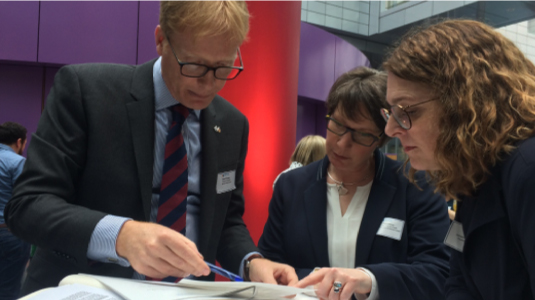SFC news published since 2018. See SFC archived content for earlier news articles.
SFC’s Stuart Fancey on the active steps Scotland is taking to safeguard its research and innovation partnerships with Europe.


Photo Caption: Dr Stuart Fancey with Dr Gisela Philipsenburg of the Federal German Ministry of Education & Research, and Stephanie Jung of Fraunhofer.
Although the terms, timing and impact of the UK’s planned departure from the EU remain unclear, Scotland is not passively waiting to see what happens to our research and innovation relationships with our European friends.
Active steps are being taken to safeguard our close ties with Europe, and the most recent of these took place last week in Berlin, where I joined the #ConnectedScotland delegation for roundtable discussions with German colleagues following the British Council’s Going Global conference.
This Scottish-German round table included our own Minister for Further Education, Higher Education & Science, Richard Lochhead, the RSE President Dame Anne Glover, Universities Scotland convenor Professor Andrea Nolan, representatives from 12 Scottish universities as well as academic and government colleagues from Germany.
Our programme of presentations and conversation focused on how to build on the success of Scotland and Germany’s strong research and innovation partnerships – the undeniable evidence of which can be seen in both the number of co-authored papers (only the USA co-authors more papers with Scotland than Germany) and their impact (co-authored papers with German universities are cited as much as twice as often as the average for either country on its own).
Richard Lochhead and Anne Glover spoke powerfully of our cultural similarities, not only in research but as tolerant, outward-looking societies. In particular, the Minister emphasised the economic benefits of research collaboration for Scotland, and Andrea Nolan also made the point that Germany is the number one partner for Scottish institutions in Horizon 2020. A recurrent theme was the value that both countries placed on the exchange of students and staff, particularly through the Erasmus programme. Students who experience education in another country carry that with them for ever.
I enjoyed chairing an afternoon session on innovation that underlined the number of companies that are working between our countries and relying on the support of bodies such as the Fraunhofer Centre in Glasgow (the UK’s first) and Scotland’s Innovation Centres to take world-leading research to market.
It was uplifting to meet alumni from Scotland’s universities in Berlin. They are truly fantastic ambassadors, each carrying the message of Scotland as a welcoming European country – one that is open for business and a great place to study, research and work.
That is a message that SFC as champions of Scottish research and innovation must continue to repeat. Fortunately our German colleagues were very receptive to this message. Yes, they were frank about the potential obstacles that Brexit might introduce but there is absolutely a common desire to work together to overcome these, which is very encouraging.
So even as the uncertainty continues, our message is unequivocal. Scotland is an enthusiastic partner in research, teaching and the exchange of people across Europe and our intention is to keep it that way.

